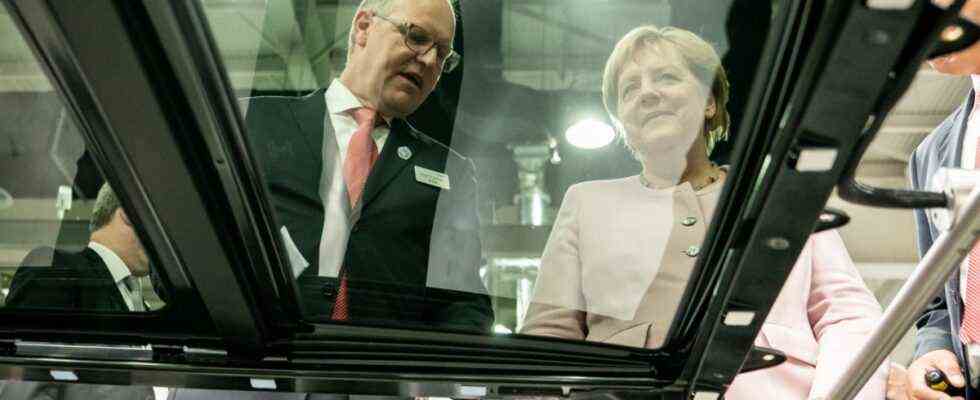China, Japan, India, Russia: The Upper Bavarian medium-sized company Webasto has become one of the 100 largest automotive suppliers in the world, primarily because of its global expansion. The traditional, family-owned company, which started producing sunroofs and roof modules in Stockdorf near Munich more than 80 years ago, now produces at 30 locations around the world. In the Corona year 2020, sales amounted to 3.3 billion euros, after 3.7 billion euros in the previous year.
Anyone who is as globally active as Webasto will automatically feel the corona crisis more than those companies that have significantly fewer interfaces with other countries. Or is it not? In the case of Webasto: both and. The company was the focus of attention at the beginning of the pandemic because one of its employees was identified as patient zero in Germany in spring 2020. The virus was introduced into the company’s headquarters from China. At that time, the whole of Germany looked to Webasto and its crisis management.
Investments in new technologies: Webasto will present a concept car for autonomous driving in Shanghai in April 2021.
(Photo: via www.imago-images.de/imago images / VCG)
Today the company looks back on 18 months of pandemic and draws the conclusion: Everything could have been much worse. “Overall, we have come through the Corona period better than we initially expected. It was important to us to maintain operations as best as possible with the reduced resources, to ensure supply chains and to prioritize customer projects accordingly.” Ironically, the supposed Achilles’ heel, namely having to profitably coordinate dozen of locations around the world during a pandemic in which all countries largely isolate themselves, became Webasto’s advantage.
Companies that buy locally like Webasto are doing better
As has been common in the automotive industry for a while, the Upper Bavarians buy as regionally as possible. One produces “in the market for the market”, is the name of the corresponding marketing clause, which is actually intended to express the connection between a manufacturer and the respective location. This also happens a little out of necessity, because mandatory localization quotas actually leave no alternatives. But the regulatory framework paid off for Webasto in the pandemic. “That’s why we weren’t as affected by supply chain fluctuations as other companies.”
Many German companies are dependent on supplies from abroad. For example, those small and medium-sized companies that do German workmanship with many individual parts from all over the world, but do not have their own locations abroad for business reasons. The general manager of the Federation of German Industries (BDI), Joachim Lang, warned in mid-August that “the current good situation in the European economy” should not hide the threat of economic risks. Mainly because maintaining supply chains can become an ongoing challenge for German companies. “The global fourth corona wave and ongoing delivery problems for preliminary products threaten to endanger the intact economic recovery in the second half of the year,” said Lang.
A worker in the plant of the German auto supplier Webasto producing a car roof.
(Photo: – / picture alliance / – / Webasto Group / dpa)
These and similar concerns plague hundreds of thousands of companies in this country. A current study by the Kreditanstalt für Wiederaufbau (KfW) has determined that 650,000 small and medium-sized enterprises fear a “lasting negative impact” of the crisis on the demand for their most important products or services. This affects numerous trading companies, but also many from the manufacturing sector.
How many companies will perish is speculation. But what could help them is clear: more capital. With new investments, the problem children could forge new plans, develop new products and find new customers. But now, of all times, the banks are not making it easier for companies. Webasto also felt this. “In general, we are experiencing that lending has become a bit more restrictive,” says CEO Holger Engelmann. The entire automotive sector is affected, i.e. all activities in the area of supplier parts, products or services.
Anyone who depends on supplies from abroad can have difficulties with financing
The transformation of the industry with new drives and mobility concepts is only one reason for the reluctance of the banks. The “logistical challenges that have increased again over the past year and a half” is another. The planning uncertainties caused by Corona have tightened the requirements for lending. Anyone who operates internationally and is dependent on supplies from abroad can have difficulties with financing. This makes high equity ratios all the more important in order to be able to close possible gaps out of pocket. In addition, Webasto has secured itself with sufficient credit lines “in order to be able to continue to pursue our corporate strategy even in a troubled market environment”, as Engelmann says. In this way, the company was able to successfully avoid financial bottlenecks in the past year.
Despite the corona-related liquidity concerns, companies are starting to get used to the new circumstances. In a survey by DZ-Bank, which has been putting the mood among German medium-sized companies through their paces twice a year since 1995, the corona crisis now only ranks third in the list of the greatest challenges. With an all-time high of 80 percent approval, the bureaucracy is now in first place, followed by the shortage of skilled workers.
However, bureaucracy and the shortage of skilled workers are likely to have been mentioned so often because the pandemic has exacerbated the problems. Uncomplicated government aid has by no means happened to every company in the past 18 months. And the shortage of skilled workers is not a new problem, but one that is intensified by travel restrictions. Many potential specialists from abroad who were considering moving to Germany before the pandemic have put their plans on hold for the time being. In this respect, the deficiency is also a specific expression of the corona worries.

